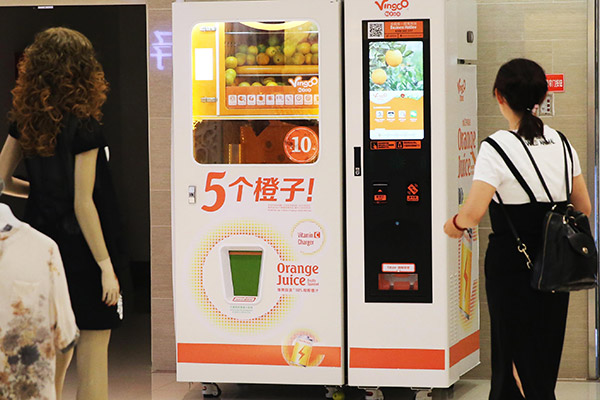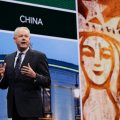
Whenever she passes by some malls in Beijing, Du Ni, 28, a bank employee in Beijing, buys a cup of fresh orange juice from an automated vending machine.
“My husband likes the juice. It’s priced around 10 yuan ($1.5) per cup-really cheap and fresh. I think such orange juice has quality and is safer than that extracted from manually operated machines. I can also see the process of juice extraction. I’d try other fruit juices, whenever they become available through such vending machines,” Du said.
Vingoo Juice, a brand that developed the first automated orange juice vending machine in the world five years ago, now takes about 50 percent of the niche market share in China.
The machines are mostly located at airports, train and subway stations, colleges, hospitals, malls and sightseeing spots.
By June-end, Vingoo Juice had more than 3,000 machines in 176 Chinese cities. The company sells 4 million cups of orange juice every month, higher than its combined sales between 2013 and 2015.
For a consumer, all it takes is 40 seconds to lay his or her hands on the juice cup.
The transaction starts with a mobile phone scan of a QR code displayed on the vending machine. It is followed by mobile payment using tools such as Alipay, ApplePay or WeChat Pay. Then, the machine peels a juicy orange, crushes it to extract its juice into a cup, seals it with a wrapper and dispenses it, all in full view of the consumer.
Zhou Qi, founder and CEO of Shanghai Geant Investment Co Ltd, the company behind the Vingoo Juice brand, said the vending machine was developed in-house.
He said the machine has helped remove intermediaries in distribution of fresh fruit, and directly connects consumers with fresh orange-producing areas.
“Our consumers are diversified. Orange juice is rich in natural nutrition, and it is healthy and fresh, which is suitable for both the young and the old. We’ll further develop our orange farms, increase sales outlets and upgrade service quality,” he said.
Vingoo Juice is now seen as a successful user of the online-to-offline, or O2O, model.
In October, Geant announced that it has finished its B round of financing for 400 million yuan. It also said it plans to forge a smart eco-system that integrates agriculture, industry and new retail (O2O retail).
Soon, the company will launch new automated vending machines that operate on a 24-hour basis at unmanned kiosks to dispense fresh food.
The company will also launch separate automated vending machines to make ice cream and coconut juice. After drinking the fresh coconut water, consumers can take home freshly extracted coconut pulp.
Zhou said unmanned smart vending machines are set to gain in popularity among consumers. So, the company has been focusing on research and development of such machines, and will innovate further in this direction.
“We still have a vast unexplored market. We’ll further expand the domestic market, and enter the Southeast Asian markets and European markets that are involved in the Belt and Road Initiative.”
Wang Wenlong, partner of Legend Capital, said as a brand, Vingoo Juice has created a new spending scene, in line with the ongoing consumption upgrade in China. It also helps avoid rising production costs.
“China has advanced information technology infrastructure and mobile payment methods, and relatively under-developed food industry facilities. In this kind of environment, the unmanned food and beverage vending market will see significant growth opportunities.”


